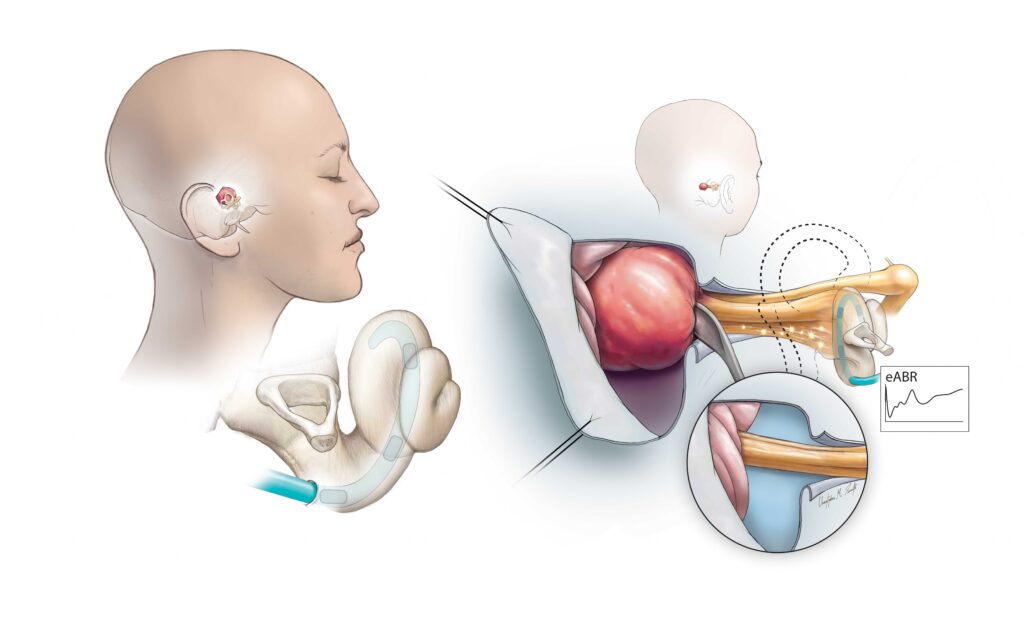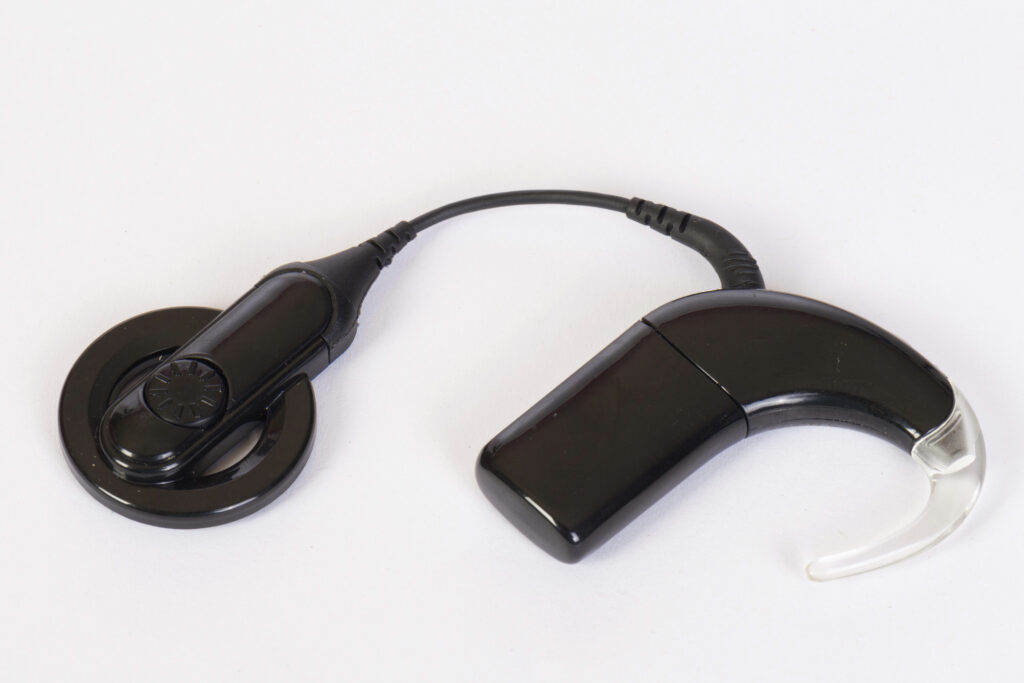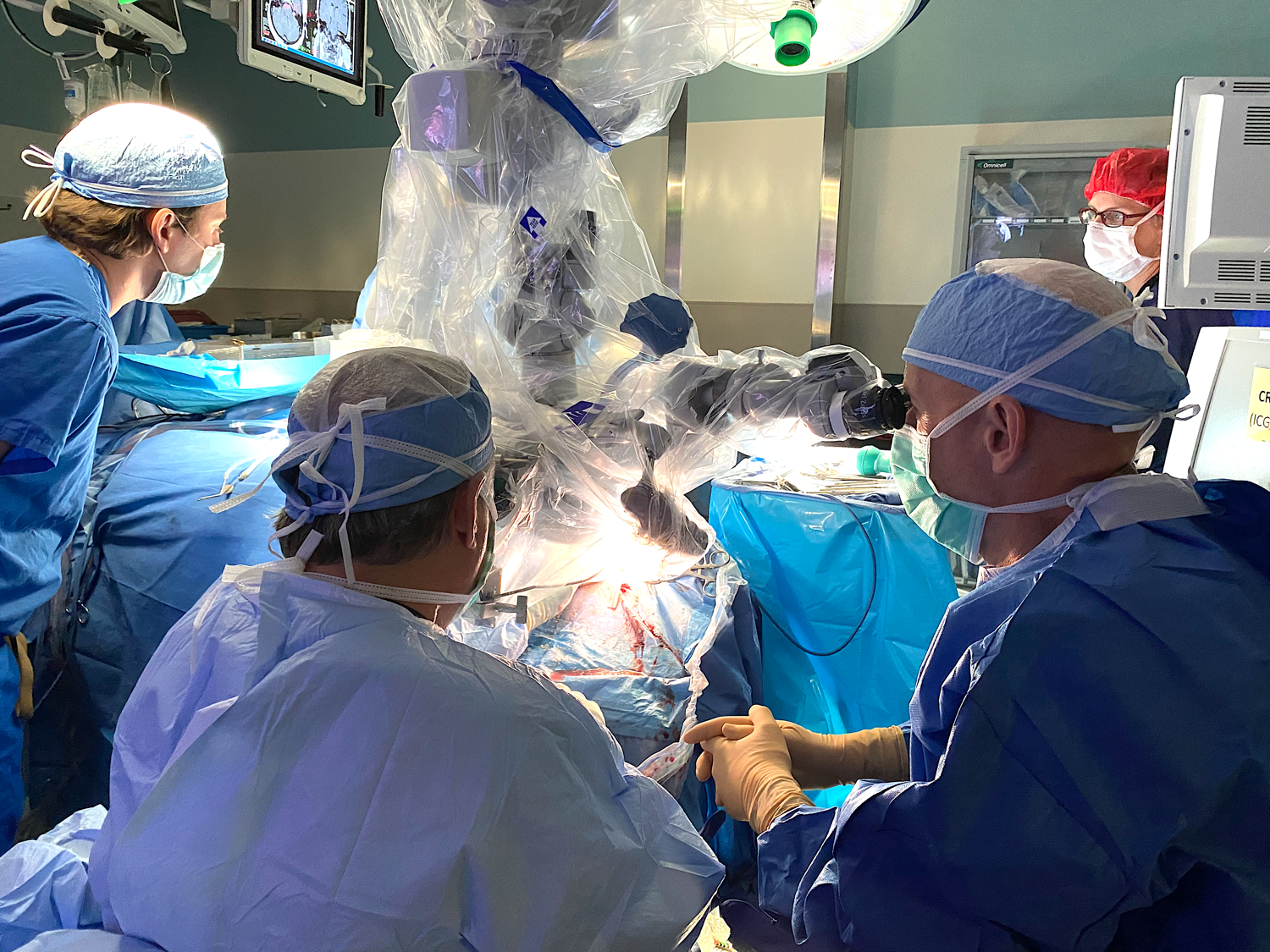Acoustic Neuroma
An acoustic neuroma is a rare, noncancerous (benign) tumor that develops on or around the main nerves connecting the ear to the brain.
The tumor grows slowly and presses on the nerves responsible for hearing and balance. This pressure can cause hearing loss, vertigo, loss of balance, and ringing in the ear, also called tinnitus.
Acoustic neuroma is also called a vestibular schwannoma because the tumor is caused by the overproduction of Schwann cells (i.e. schwannoma) which cover the balance (or vestibular) nerve fibers.

Signs and symptoms of acoustic neuroma are often subtle and occur over many years.
Common symptoms include:
- Hearing loss in one ear
- Tinnitus, or ringing, in the affected ear
- Loss of balance or unsteadiness
- Dizziness (vertigo)
Most acoustic neuromas grow slowly. If a tumor does grow quickly, then symptoms may develop more rapidly. Larger tumors are more likely to cause symptoms beyond hearing loss and balance problems. If large enough, they can cause facial numbness, headaches, and mental confusion. When this occurs, treatment becomes urgent.
Diagnosis of an acoustic neuroma may include a hearing test and brain imaging.
Hearing test
Initial testing to diagnose an acoustic neuroma is usually a hearing exam or audiogram. If hearing loss is worse in one ear, further testing is required.
Brain imaging
Magnetic resonance imaging (MRI) is usually performed. This imaging study will show the eighth cranial nerve and clearly define an acoustic neuroma if it is present.
For patients not able to undergo an MRI, computerized tomography (CT) with contrast may be performed. While not as sensitive in diagnosing tumors, CT may reveal larger tumors.
Treatment plans are based on each patient’s situation including size of the tumor, hearing status, symptoms, and the patient’s overall health. The patient and their multi-disciplinary team work together to create the best individualized plan for each patient.
There are three treatment options for managing most acoustic neuromas.
- Observation with repeat imaging: Because acoustic neuromas are slow growing and may even go through phases without growth, some tumors can be monitored. This is the best option for patients who are older or who have smaller tumors.
- Noninvasive stereotactic radiation: Gamma Knife radiosurgery delivers radiation precisely to the tumor to stop its growth, while limiting damage to the surrounding tissues. It does not require surgery or an incision, and does not remove the tumor. Conventional external beam radiation therapy can also be used.
- Microsurgical removal of the tumor: Depending on the size of the tumor and the patient’s hearing, a team of surgeons (neurotologists and neurosurgeons) may surgically remove the tumor.
Acoustic neuromas can be approached from behind the ear (retrosigmoid), above the ear (middle fossa), or through the ear (translabyrinthine). Your surgeons can help you determine which option is optimal for your specific situation.
Selecting a provider
When surgery or radiation is necessary, picking the most experienced provider is important. This is why patients should seek out acoustic neuroma experts who:
- Work together as a multidisciplinary team of experts in neurotology, neurosurgery, radiology, radiation oncology, audiology, physical therapy and ophthalmology
- Have significant experience performing these treatments
- Offer advanced clinical trials
- Participate in innovative research programs seeking cures
Acoustic neuroma experts
Meet your experienced team.
Need to make an appointment?
In-person and virtual options.

What to expect as a Washington University patient
Expert treatment
Our board-certified providers have treated more than 1,000 acoustic neuroma patients.
The latest treatments and technologies
Our leading-edge technology provides the best outcomes and patient experiences, including shorter hospital stays.
Hearing preservation
Our clinical trial, available only with Washington University surgeons, offers the potential for hearing preservation and restoration.
Reduced complications
Complications and readmissions occur less often.
Convenience
Patients are often able to fit travel time and multiple appointments into a single day.
Communication
We coordinate care with the patient’s other providers to ensure the most cohesive experience for our patients.
Top-ranked hospitals
We operate out of some of the best hospitals in the country including US News & World Report’s top-ranked Barnes-Jewish Hospital, Barnes-Jewish Hospital West County and St. Louis Children’s Hospital.
What sets Washington University apart?
Washington University is at the forefront of technological advances that have greatly improved acoustic neuroma treatment and care.

Hearing preservation and restoration
Washington University surgeons are the only acoustic neuroma experts in the country offering hearing restoration while removing the acoustic neuroma.
Learn more about this procedure »
Alternatives to traditional brain surgery
The Gamma Knife radiosurgery is a sophisticated system that allows surgeons to target tumors with gamma radiation. Accurate to less than one tenth of a millimeter, the Gamma Knife leaves healthy tissue untouched while eliminating the need for general anesthesia, opening the skull, or an overnight hospital stay. Washington University surgeons work closely with experts at Siteman Cancer Center which houses the only Gamma Knife radiosurgery center located within a 240-mile radius of St. Louis.
Learn more about the Gamma Knife »
State-of-the-art brain imaging

Advanced brain tumor imaging guides surgeons in treatment and diagnosis. Procedures include STEALTH, known as “GPS for the brain,” fluorescence-guided surgery, functional brain mapping and intraoperative MRI.
Learn more about advanced brain imaging »
Acoustic neuroma clinical trial

Clinical trial to restore hearing
Surgeons at Washington University School of Medicine in St. Louis made history when they completed the first case in a clinical trial to restore hearing in patients with vestibular schwannomas, also known as acoustic neuromas.
The operation at Barnes-Jewish Hospital marked the first use of the MED-EL Auditory Nerve Test System (ANTS) in North America, allowing simultaneous removal of a vestibular schwannoma and placement of a cochlear implant. Conceived by Department of Otolaryngology Chair Craig Buchman, MD, and neurotologist Cameron Wick, MD, the clinical trial received FDA-approval for use of the ANTS under an investigator-initiated investigational device exemption (IDE) from the United States Food and Drug Administration (FDA).]